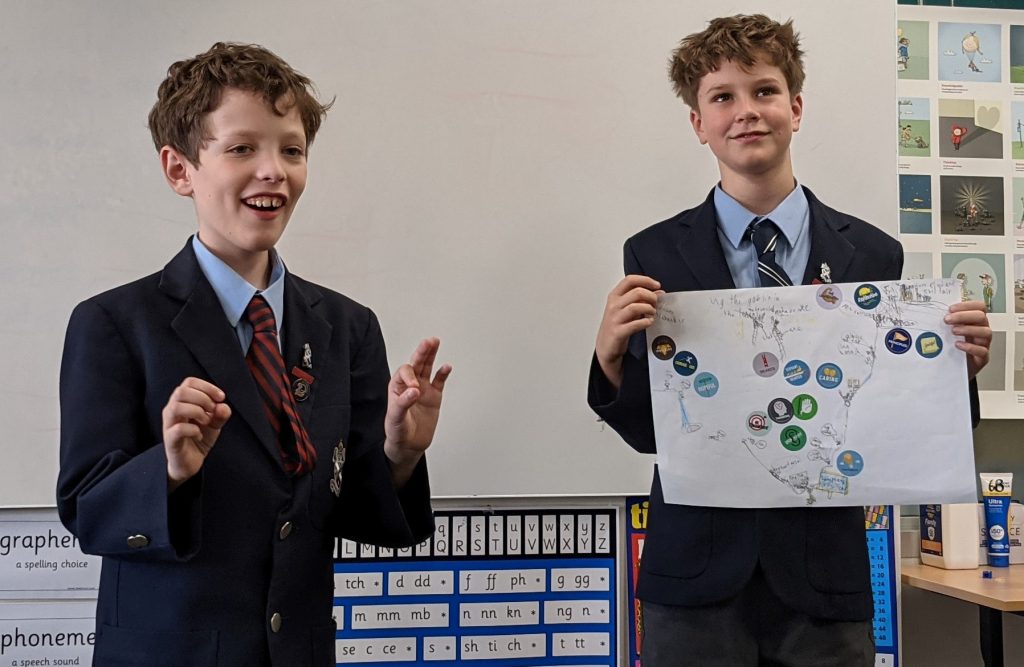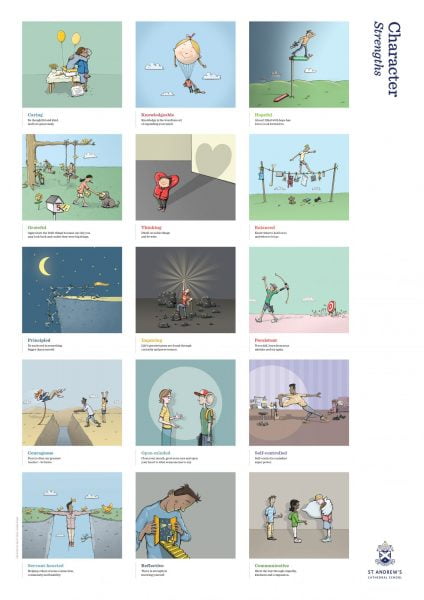The development of character is at the heart of our teaching and pastoral care. Our integrated wellbeing framework incorporates character development that is matched with the learner traits of the International Baccalaureate (IB) Programme. We intentionally embed this through our weekly social and emotional wellbeing lessons, through the teaching of specific Character Strengths, specific learning activities, as well as through meaningful discussions which arise from everyday school life.
The language and strategies of the evidence-based positive psychology approach is used consistently from K-12, whilst always tailored to our Christian context.

Our wellbeing programme
Influenced by Professor Lea Williams, from Swinburn University of Technology, our wellbeing programme encompasses the St Andrew’s Cathedral School Character Strengths; emotional management; attention and awareness; relationships; coping; and habits and goals. These concepts are explicitly taught through our classroom-based Social and Emotional Wellbeing (SEW) lessons as well as reinforced through broader activities outside of the classroom, such as in chapel, assemblies and the playground.
Character Strengths
Character education equips young people to grow in wisdom and hope, so they can learn to use their developing knowledge and expertise in ways that positively impact those around them. Our Character Strengths are embedded into the life and culture of the Junior School in a range of ways. The images for each Character Strength are displayed in classrooms, hallways and playgrounds to build within students a sense of understanding and familiarity with the Strengths. Classroom teachers focus on integrating discussions of Character Strengths within their lessons and classroom activities. ‘Strength spotter’ stickers allow staff to encourage those students who display these Strengths and to demonstrate the importance we place on them.
Emotional management
We share the language of the Zones of Regulation, encouraging students to build an understanding of their own emotions and showing students how these can change. We teach students to recognize their responses when they are outside of the green/calm zone and explore tools to return to this ready to learn zone.
Attention and awareness
As students learn and grow, their ability to maintain attention also grows. We intentionally teach students about the skills required to grow this skill, through the Memory Mates programme as well as teaching about the focus of the reticular activating system (RAS) within the brain, with the “sifty sooty” character.
Relationships
We understand that for students to learn well, they require a sense of security and belonging, and for many students their relationships with their friends are the highlight of their school days. Through the URSTRONG friendship programme, we teach students the qualities of healthy relationships, how to resolve minor conflicts – “Friendship Fires” – and how to respond to “mean-on-purpose” behaviours. Our Stage 3 students learn ways of resolving conflict from a biblical perspective through PeacewiseKids in which we explicitly teach students language they can use to talk out problems as well as how to authentically communicate an apology.
Coping
The ability to bounce back from setbacks and persevere through challenges is a vital life skill as well as being key to learning. We use the language of the Learning Pit and Growth Mindset to build in students the ability to cope with challenges and to be resilient through difficulties.

Habits and goals
We work with students to set SMART goals and to establish habits of learning which support and motivate their growth. Routines of thinking and routines of action are practised in order to develop automaticity and independence. Establishing habits and goals promotes stability and gives students a sense of confidence, a sense of control and ultimately the ability to self-regulate their behaviour and learning.
You may also be interested in

